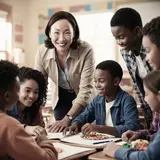Teaching History for All: the NCSS’s Approach to Diverse Perspectives in Education

How does the National Council for the Social Studies (NCSS) respond to the importance of diverse perspectives within social studies education?
NCSS President Jennifer Morgan gave an address at the most recent NCSS conference on this very topic, in Boston, last November. In her speech, Morgan focused on the vital role of social studies education in shaping informed citizens, especially in today’s political climate. She outlined both the progress and challenges in social studies education: incorporating diverse perspectives, engaging students in civic learning, and navigating curriculum debates. In spite of the challenges, she expressed hope, urging educators to persist in their mission to teach critical thinking and democratic participation. She concluded with a strong message: educators play an essential role in shaping the future, one student at a time.
You can read Morgan’s full speech in Social Education, the NCSS’s publication, under the title “Shaping the Future: One Student, One Lesson, One Conversation at a Time.” Her speech could have taken many angles (foundational understandings of civic responsibilities, for instance, or the complexity of teaching American history), but her choice to focus on diverse perspectives is a notable one. What does it mean to be a good citizen, in a nation where backgrounds and worldviews are often radically different? How can we make civic education truly objective? In curriculum debates that may touch on sensitive topics, teachers may find themselves caught between extremely different ideologies, manifested in the classroom.
While critical thinking is a pillar of education, it must be grounded in the truth, not used to reinforce our biases. Teachers play an incredibly sensitive, impactful role; it is almost daunting to truly consider the implications of our influence on our students. When we “shape the future,” as Ms. Morgan describes, we must do so with tremendous mindfulness and adherence to our highest values.
Education is, at its core, the foundation of a healthy democracy. Civic awareness, as we might call it, equips our students with the tools that they need to navigate the complex political dialogues of our time. In an era of misinformation and polarization, it is only becoming more critical for students to successfully analyze sources and participate in their communities. An informed citizenry leads us to a more just and democratic society, every time.